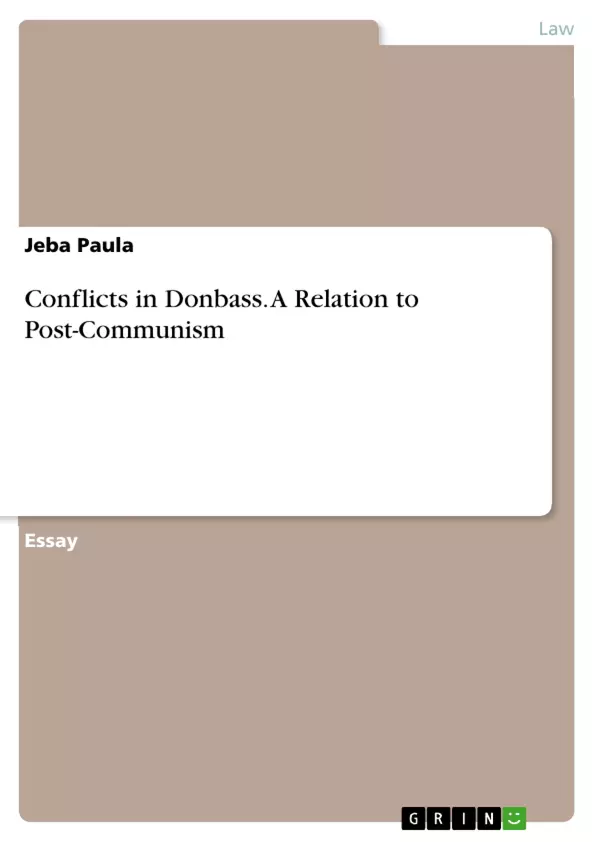The recent armed conflicts in Donbass have reminded the world again of the traces of Post-communism. This paper aims to prove that no event is singular in terms of history and Donbass is also not different. Arguments are presented for proving the underlying relationship between the fall of Communism and the current Donbass war.
In the Eastern European countries, a wave of revolutions marked the fall of communism by overthrowing their governments and transferred power to capitalist governments in 1989. These countries gained independence from the USSR and USSR dissolved, creating the present Ukraine and Russia. This fall of communism is one of the direct causes of the current war in the Donbass region of Ukraine, starting in 2014 between the government and the pro-Russian rebels. This armed conflict has its roots in the fall of communism and that they are interconnected between them with nationalist, economical and geopolitical basis.
The fall of communism laid the groundwork for the ongoing war in Donbass by creating conflicts between Ukrainian and Russian nationalism. Nationalist resentment between these two countries resulted in Russia-EU and Russia-NATO conflict, which are the main reasons behind the current war.
Inhaltsverzeichnis (Table of Contents)
- The Fall of Communism
- Revolutions in Eastern Europe
- Dissolution of the USSR
- The War in Donbass
- Donbass Separatist Forces
- The Role of Russia
- Nationalist Resentment
- Ukrainian and Russian Nationalism
- The Donbass Region
- Economic Interests
- Russia and the European Union
- The Eurasian Customs Union
- Russia and NATO
Zielsetzung und Themenschwerpunkte (Objectives and Key Themes)
This text aims to analyze the interconnectedness between the fall of communism and the ongoing war in Donbass, Ukraine. It explores the historical context of the collapse of the Soviet Union, the rise of nationalism in Ukraine, and the economic and geopolitical interests driving Russia's involvement in the conflict.
- The fall of communism and its lasting impact on Eastern Europe
- The emergence of nationalism in Ukraine and the division between pro-Russian and pro-European factions
- Russia's economic and geopolitical interests in Ukraine and the region
- The role of the European Union and NATO in the conflict
- The ongoing struggle for control over the Donbass region
Zusammenfassung der Kapitel (Chapter Summaries)
The text begins by outlining the chain of events that led to the fall of communism in Eastern Europe, starting with the revolutions in Poland and spreading to other countries, ultimately leading to the dissolution of the USSR in 1991. It then focuses on the war in Donbass, highlighting the separatist movement and Russia's involvement in supporting the rebels.
The text explores the roots of the conflict in nationalist tensions between Ukrainian and Russian identities, particularly in the Donbass region, where many residents identify more closely with Russia than Ukraine. This division is further exacerbated by competing economic interests, with Russia opposing Ukraine's integration into the European Union and seeking instead to establish a Eurasian Customs Union to expand its influence in the region.
The text also delves into the complexities of the Russia-NATO relationship, highlighting the historical animosity between the two powers and how this has contributed to Russia's intervention in the Donbass conflict.
Schlüsselwörter (Keywords)
The text focuses on key terms and concepts such as the fall of communism, post-communist transitions, Ukrainian and Russian nationalism, the Donbass region, the European Union, the Eurasian Customs Union, Russia-NATO relations, and geopolitical interests.
Frequently Asked Questions
How is the fall of communism related to the war in Donbass?
The fall of communism led to the dissolution of the USSR, creating the independent nations of Ukraine and Russia. This transition laid the groundwork for future nationalist, economic, and geopolitical conflicts.
What role does nationalism play in the Donbass conflict?
The conflict is fueled by tensions between Ukrainian and Russian nationalism. In the Donbass region, many residents identify closely with Russian culture and identity, leading to separatist movements.
What are Russia's economic interests in Ukraine?
Russia has sought to integrate Ukraine into the Eurasian Customs Union and opposes Ukraine's integration into the European Union to maintain its economic and political influence in the region.
How does the relationship between Russia and NATO affect the war?
Long-standing animosity and geopolitical competition between Russia and NATO are key drivers of the conflict, as Russia views NATO's eastward expansion as a direct threat to its security.
When did the armed conflict in Donbass begin?
The armed conflict between the Ukrainian government and pro-Russian rebels in the Donbass region started in 2014, following the wave of political changes in Ukraine.
- Citar trabajo
- Jeba Paula (Autor), 2017, Conflicts in Donbass. A Relation to Post-Communism, Múnich, GRIN Verlag, https://www.grin.com/document/382984



